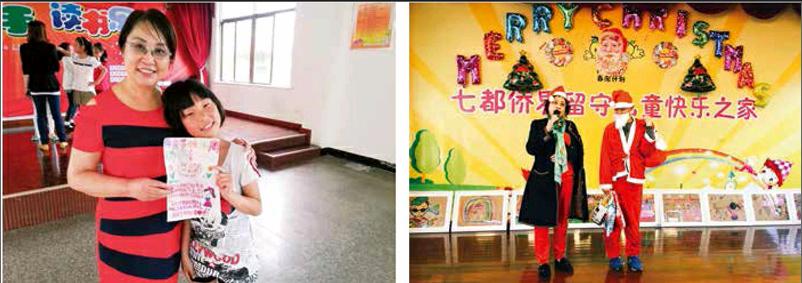侨乡留守儿童的快乐之家
2017-07-24戚祥浩
戚祥浩



“妈妈,我好想你。记不清多少个夜晚,因为对你的想念,我泪流满面。看到电视里别人的父母都在家里,享受家的温暖,我好羡慕。可我知道,你们在国外也非常辛苦……有件事一定要告诉你,七都办了个‘留守儿童快乐之家,那里真的很好,有多媒体教室。周末,有很多大学生来给我们上课,教我们唱歌、手工、做游戏等。我们上课都是免费的,我觉得他们像家人一样,我在这里很快乐。等你来的时候一定要去看看……”
这是温州市鹿城区七都街道留守儿童黄伊凡写给远在海外母亲的一封信。
侨乡七都,许多远赴异国他乡打拼的父母,只能把年幼的孩子们留在长辈身边,他们往往连续多年见不到彼此。
邋遢、孤僻,留守儿童身上惯有的烙印,在这些孩子身上却全然不见。走进七都留守儿童之家,孩子们个个脸上都洋溢着天真烂漫的笑容。只因为,他们有一个共同的周奶奶。
周奶奶名叫周祥薇,抱着儿孙尽享天伦之乐,是周祥薇这个年纪很多温州老人的第一选择。66岁的周祥薇却“花钱买辛苦”,把所有能挤出的时间都给了七都岛上的留守儿童。创办“快乐之家”,为孩子们找回属于他们的快乐,周祥薇已经坚持了十年。
今年1月,在“最美浙江人——2016年度浙江骄傲人物评选”活动颁奖典礼上,周祥薇成为温州地区唯一入选者。她此前还荣获“中国侨界杰出人物”等荣誉称号。但在周祥薇看来,没有什么比“为孩子们弥补缺失的亲情,找寻到成长的快乐”更加重要。
为留守孩子寻找快乐
早在改革開放初期,周祥薇便开始闯荡市场。随着生意规模的扩大,周祥薇经常要远赴欧美国家。与在异国打拼的亲朋好友相聚时,大家最忧心的莫过于留在家中的孩子。
“家家是侨户,人人是侨民”的七都岛有200多名留守儿童,“隔代教育”率达100%。每逢周末或寒暑假,这些孩子往往只能与电视相伴。因为缺乏父母陪伴关爱,一些孩子的性格变得十分孤僻。
“老人家带孩子,对孙辈重养轻教,对他们的成长非常不利。”于是,周祥薇渐渐地萌生了一个想法,要给孩子们在小岛上建一个快乐温馨的“家”。听说周祥薇要完全免费做这件事时,大家难以相信自己的耳朵,各种质疑声纷至沓来。
周祥薇用对孩子的各种关爱举动来回应质疑。她与镇里联系,将原来老村活动室腾出来做“快乐之家”,她和女婿带头出资40万元,并发动其他华侨侨眷纷纷解囊,募得资金135万元。终于,一幢450多平方米、带室外活动场地的三层小楼落成了,七都留守儿童有了“快乐之家”。
“我带孩子们烧烤,培养他们动手的能力;陪孩子们游葡萄园、赏荷花,告诉他们要珍惜农民的劳动成果;开设模拟法庭,让孩子们从小学习法律知识,懂得怎样做人;带孩子们观摹瓯塑、瓯绣,希望他们多了解家乡优秀的传统文化,不要忘记自己是温州人。”周祥薇忙得像陀螺一样,整个身心围着孩子们不停地转动。
为了让孩子们真正感到快乐。周祥薇不断与温州大学协调,使“快乐之家”成为该院实践基地。大学生来这里教孩子们学习国学、美术、作文、英语等,每到周末或暑假,这里总是岛上最热闹的地方,朗朗书声、悠悠乐音在小岛上荡漾开来。
让儿女与父母重建亲情沟通
孩子们课余生活丰富了,知识长进了,但周祥薇发现了新的问题。她与这些孩子们交流中发现,他们的心理困扰还没有解除。在七都,许多留守儿童一出生就离开父母,对父母艰辛创业并不理解,还经常责怪父母不关心自己的成长。为了让孩子们了解父母的苦心,每个周六“快乐之家”开课的时候,周祥薇都会抽出时间给孩子们讲自己创业的艰辛经历,理解父母在异国打拼的艰难,使孩子们懂得珍惜眼下的学习和生活;利用各个节日教育孩子们给父母写一段话,主动给父母打电话问候。
“妈妈,我从视频里看到,你额头上刻上了一道深深的皱纹。原来浓密的黑发上,不知何时也爬上了几缕银丝。那是为我家日夜操劳的象征。妈妈,您辛苦了。”
“爸爸,其实我一直都知道,您对我的爱是无私的,就像一片大海,里面埋藏着许多珍贵的宝藏,可表面上却表现得那么平静。爸爸,我还要提醒你一点,不要再吸烟了。老师说过,吸烟有害身体健康。还有少喝酒,喝酒伤身体呢。”
……
“印象最深的是,我让孩子们在母亲节的时候,给自己的妈妈写一封信。后来我选了几封信现场念了一下,念着念着我就哭了,孩子们也哭了。那种对远在异国他乡的母亲的思念之情,流淌在孩子们稚嫩的笔尖。”周祥薇说,这些宣泄情感的举动,无形中也拉近了留守儿童和父母的距离。
周祥薇还主动向心理专家和老师请教有关儿童心理学的知识,和温大的心理学系合作,给孩子们上集体心理辅导课,并因人而异进行心理辅导。
暑假快乐营中,周祥薇白天与孩子们一起上课,放学后则带着大学生到孩子家里家访,为每个孩子建立档案,了解困扰他们的难题,在孩子与父母之间重建一座爱的桥梁。
许多孩子的人生从此转变
留守儿童徐梓伟不到两岁就被父母从意大利送回七都,由爷爷奶奶抚养。常年缺失亲情的小梓伟性格孤僻。爷爷奶奶目不识丁,无法辅导他的学习,成绩糟糕又调皮的小梓伟成了同学们眼中的“坏孩子”。奶奶记得,孙子近两年时间没有过笑容。当奶奶得知村里其他人都把孙辈送往留守儿童“快乐之家”时,也把徐梓伟送了过去。
很快,在一群活蹦乱跳的孩子中,周祥薇注意到了沉默寡言的徐梓伟。
“我把他抱过来,坐到自己身上。我问他,你为什么不开心啊,他就哭,捧着脸大哭一阵。然后我说徐梓伟别哭,周奶奶很喜欢你。这里有很多的同学、老师都很爱你。你有什么事情同周奶奶说,周奶奶会帮你,有很多老师一起帮你。”
周奶奶真心的拥抱让这个不会笑的孩子感受到了亲人般的温暖。那一刻也永远定格在了小梓伟的内心深处。她还把徐梓伟接到了自己家里,吃住一起。
三个星期后,大家看到了徐梓伟最明显的变化:他脸上的笑容渐渐多了起来。快乐之家,真正成为了小梓伟找寻快乐的地方:每到周六,小梓伟都会很早起床,盼望去“快乐之家”学习绘画、剪纸、书法......最重要的是每一次他都能得到慈祥的周奶奶一个大大的拥抱。小梓伟变得越来越开朗。
“快樂之家”给孩子带来的变化远不止此。连日来,七都居民胡长滔沉浸在兴奋中。他把“孙子胡铂烨捧回绘画比赛第一名”的消息,对分布在多个国家的亲友挨个说了个遍,成为大家的一件乐事。
胡长滔称,“快乐之家”像变戏法一样,让进去的孙子变了样。孩子学习后展露的天赋,让胡长滔有了让孩子试着往美术方面发展的念头。
这样的例子,在七都岛举不胜举。
针对问题孩子,周祥薇组织家访,和国外的父母取得联系,帮助孩子解决心理难题;她自掏腰包举办儿童书画展、演讲比赛、文艺演出,带孩子们参观博物馆、科技馆、游历温州的风景名胜;开学了,她给孩子们送书包和文具;儿童节到了,给大家筹办文艺演出、游园等丰富的活动;端午、中秋、春节来临,给孩子们送去小粽子、小月饼、小年货……
周祥薇的一举一动赢得了七都人的尊重。走在七都岛的路上,不仅随处可以听到孩子亲切地喊她“周奶奶”,而且上了年纪的老人同样喊她“周奶奶”。
十年间,孩子们换了一批又一批,一些孩子出国回到了父母身边,又有新的一些孩子加入。但从来不变的是周祥薇全心全意的爱心付出。哪怕,一次次顾不上家庭遭致丈夫埋怨;哪怕,亲孙子刚在美国出生需要陪伴;哪怕,企业太多事情让她无法分心……每个周末和暑假,她总能出现在孩子们面前,脸上挂着招牌式的慈祥微笑。
“现在每逢过年,很多华侨都会给我打电话表示感谢,说自己的小孩变好了,这是我最高兴的时候。”周祥薇希望从这里走出去的孩子,将来都能成为有用的人,回报父母、回报家乡、回报国家。
把“快乐”一直接力下去
为了更好地照顾孩子,周祥薇专门聘了一个管理员。她那里有一份七都岛留守儿童的名单。每个周末,管理员都会提醒孩子的爷爷奶奶,别忘记送孩子来“快乐之家”。
有一回,一个孩子偷偷溜出去玩耍。周祥薇急疯了,赶紧跑出去寻找。七都岛被涛涛海水包围,周祥薇不敢想象,如有意外,她该如何向孩子的爷爷奶奶交待。还好,那次孩子找回来了。
比起个别孩子的调皮,更让周祥薇感到压力的是,自己的身体逐年衰老,还能扛起“快乐之家”多久?
“我要一直做到做不动为止。孩子们缺乏父母关爱我是看在眼里的,无论遇到怎样的困难,我都会像做事业那样坚持下去。”周祥薇的眼睛里露出坚毅的神情。
近年来,周祥薇开始习惯性带着自己的孙辈,一起给七都岛的留守儿童送衣送物,在自己的孙辈的心里,从小种下爱心种子。
不少从“快乐之家”成长起来的孩子,他们回到国外父母身边后,依然对“快乐之家”念念不忘。他们不断通过微信、书信、贺卡等,表达自己的感激之情。
“我还记得‘快乐之家同学们聚在一起多么快乐!您对我们这些父母在国外、缺少父母关爱的孩子照顾有加……如今我到了美国,还惦记您的好。”在给周祥薇的来信中,曾经的留守儿童张仙仙这样写道。
让周祥薇欣喜的是,越来越多从“快乐之家”里走出的孩子,动员家里人,把玩具送到“快乐之家”其他小朋友手里。
“这些孩子的爱心,将会成为‘快乐之家延续下去的最大力量。”周祥薇说。
Qidu Island in Wenzhou is special in many ways. The 12.7-square-kilometer island is only several hundred years old, it is in the Ou River, and it is about 13 kilometers from the city proper of Wenzhou. The island now has a registered population of 9,200, but more than 15,200 islanders have moved overseas. Over two hundred kindergarteners and primary school pupils are children of islanders who are now in foreign countries. In fact, these kids are born foreigners. They are at home of their parents largely because their parents have no time for them. Some stay on the island until they need to go to school or some finish primary school and go abroad for secondary education.
The river island is by no means a paradise on earth. Floods and typhoons hit it every year. Islanders are in the tradition of going away to make a living. In early decades of the 20th century, many islanders got employed on foreign ships that docked at Wenzhou. Their relatives and friends soon followed suit. The islanders who went overseas before 1949 are now referred to as the first generation of migrants. The second generation refers to those who went overseas in the years between 1949 to late 1970s. The third generation refers to those who went overseas since the country embarked upon the reform and opening to the outside world. Local resident registration records indicate that the population of the island has been decreasing since 1994. If one chose to stay at home and refused to go abroad to make a living, one would become a local joke. More than 90 percent of the families on the island have direct relatives who are working and living abroad.
Children come and go, but averagely there are about 200 children left behind, all under the care of their grandparents. During weekends and spring and summer breaks, they spend a lot of time watching television. Some children tend to show some problems in their personalities due to the lack of proper family attention and care.
Zhou Xiangwei first noticed the problems about ten years ago. She knew she needed to do something about these children sent back home by their parents. She wanted to build a home for these kids.
At first, her idea drew some suspicion and misgivings, but she went ahead with her plan. She first convinced the village management to find a space for the children. She and her son-in-law donated 400,000 yuan. Many other people donated too. Eventually she raised 1.35 million yuan and had a three-story house with a playground built.
The childrens home works at weekends and provides a lot of fun for the kids. Here they learn how to barbecue; they take organized tours and visit vineyards and see lotus flowers, they learn how not to waste food, they attend the imitation court to see how law works, they see local artisans working sculptures and embroidery. With her arrangements, students of Wenzhou University visit the childrens home on weekends and summer and spring vacations, holding special classes and special activities.
Shortly after the home opened, Zhou discovered a problem that tortured all the children: they didnt fully understand why they were sent home and they decided their parents didnt care for them. Zhou herself had worked overseas and understood how difficult it was for people to survive overseas. So she told them her own stories working and living overseas and tried hard to enable the kids under her care to understand how a life their parents may lead overseas. She also encouraged the kids to write to their parents and make phone calls.
Xu Ziwei was one of these kids with difficulty handling his daily life away from parents. He was sent home when he was less than 2 years of age. He grew up on the island. His grandparents are illiterate, unable to offer support and help in his adjustment to his school life on the island. For about two years, he never smiled. Then his grandma learned about the childrens home and sent him there. Zhou Xiangwei noticed the boy pretty soon. He was silent while all the other children made huge noises laughing and running around. Zhou hugged him and sat down with him. She asked tenderly why he was so unhappy. The boy burst into tears, his hands up to cover his face. Zhou said she loved him and all the teachers at the home loved him. She later brought him home to stay with her. Three weeks later people noticed changes in the boy. He began to smile and he was eager to come to the childrens home at weekends.
Over the past ten years, children come and go. Many have left the island and gone back to be together with their parents. Many new kids have joined the childrens home. Their parents are grateful to Zhou Xiangwei for her care. She gets calls from overseas during Spring Festival. They call to say thank you because their kids are better kids because of her. These calls make her happy. These kids, after they reunited with their parents, often call to say thank you to Zhou.
Zhou is worried about the future of the care center. After all, she is now 66.
